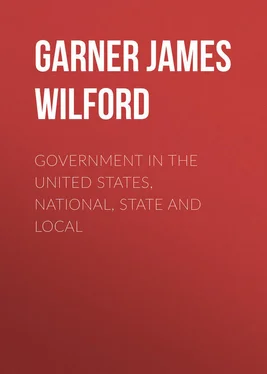James Garner - Government in the United States, National, State and Local
Здесь есть возможность читать онлайн «James Garner - Government in the United States, National, State and Local» — ознакомительный отрывок электронной книги совершенно бесплатно, а после прочтения отрывка купить полную версию. В некоторых случаях можно слушать аудио, скачать через торрент в формате fb2 и присутствует краткое содержание. Жанр: История, foreign_antique, foreign_prose, на английском языке. Описание произведения, (предисловие) а так же отзывы посетителей доступны на портале библиотеки ЛибКат.
- Название:Government in the United States, National, State and Local
- Автор:
- Жанр:
- Год:неизвестен
- ISBN:нет данных
- Рейтинг книги:5 / 5. Голосов: 1
-
Избранное:Добавить в избранное
- Отзывы:
-
Ваша оценка:
- 100
- 1
- 2
- 3
- 4
- 5
Government in the United States, National, State and Local: краткое содержание, описание и аннотация
Предлагаем к чтению аннотацию, описание, краткое содержание или предисловие (зависит от того, что написал сам автор книги «Government in the United States, National, State and Local»). Если вы не нашли необходимую информацию о книге — напишите в комментариях, мы постараемся отыскать её.
Government in the United States, National, State and Local — читать онлайн ознакомительный отрывок
Ниже представлен текст книги, разбитый по страницам. Система сохранения места последней прочитанной страницы, позволяет с удобством читать онлайн бесплатно книгу «Government in the United States, National, State and Local», без необходимости каждый раз заново искать на чём Вы остановились. Поставьте закладку, и сможете в любой момент перейти на страницу, на которой закончили чтение.
Интервал:
Закладка:
Assessors and Treasurer. – In the large towns there are assessors of taxes, who prepare tax lists; in the smaller ones, as stated above, the selectmen act as assessors. In all of the towns there is a town treasurer who receives and takes care of all taxes collected from the citizens, turning over to the proper officers the portion which goes to the state and to the county. He also keeps an account of all receipts and disbursements and makes an annual report to the town meeting.
Overseers of the Poor. – To care for the pauper and dependent class there are usually one or more overseers of the poor elected by the town meeting, though in the smaller towns the selectmen perform this duty. Their principal function is to determine who shall receive public aid.
Constables. – In every town one or more constables are elected. Formerly this office, like that of sheriff, was one of dignity and influence, but it has lost much of its early importance. As the sheriff is the peace officer of the county, the constables are the peace officers of the town. They pursue and arrest criminals and execute warrants issued by the selectmen and by the justices of the peace. In addition they sometimes summon jurors and act as collectors of the taxes.
School Committee. – Generally there is also a school committee elected at the town meeting. It is charged with establishing and visiting schools, selecting teachers, prescribing the courses of instruction, and appointing truant officers.
Other Town Officials are justices of the peace; road surveyors or similar officers with other titles, charged with keeping public roads and bridges in repair; field drivers and poundkeepers, who take up and keep stray animals until claimed by their owners; fence viewers, who settle disputes among farmers in regard to partition fences and walls; sealers of weights and measures, who test the accuracy of scales and measures; surveyors of lumber; keepers of almshouses; park commissioners; fish wardens; inspectors of various kinds; and a host of other minor officials, some of whom bear queer titles, and many of whom serve without pay or receive only trifling fees for their services. In some of the small towns, officials are so numerous as to constitute a goodly proportion of the population. The town of Middlefield (Mass.), for example, with only eighty-two voters recently had a total of eighteen officials. 2 2 Hart, "Actual Government," p. 172.
Town Government in the West.– Town government is not confined to New England; it has been carried to many Western states where immigrants from New England have settled, though in none of them does it possess the vitality or play the important part in the management of public affairs that it does in the older communities where it originated. In the states of the South and the far West, there is no general system of town government. Counties, however, are usually divided into districts for a few unimportant purposes.
The County.– The county 3 3 The corresponding division in Louisiana is called a parish.
is a civil division created by the state partly for purposes of state administration and partly for local government. New York city embraces within its boundaries five counties; other cities, like Chicago, Cleveland, Buffalo, and Cincinnati, contain within their limits the larger part of the population of the counties in which they are situated. The population of a large majority of the counties, however, is predominantly rural rather than urban in character, and where there is a large city within a county, most of the affairs of that portion of the county lying within the city limits are managed by the city government.
Population and Area. – The population of the counties, and their areas, vary widely. Several counties in Texas in 1910 had less than 400 inhabitants each, New York county, on the other hand, had more than 2,750,000. The most populous counties are in the Eastern states, and the least populous in the South and West. There are now about 3,000 counties in all the states, the number in each state ranging from three in Delaware and five in Rhode Island to 244 in Texas. In proportion to population Massachusetts has a smaller number (fourteen) than any other state in the Union. In many states the minimum size of counties is fixed by the constitution. The minimum limit where it is fixed by the constitution is usually 400 square miles, though in some states it is 600 or 700 and in Texas it is 900 square miles. Where no such restrictions have been prescribed, however, as in some of the old states, the area is sometimes very small. In Rhode Island, for example, there is one county with an area of only 25 square miles. New York has one county (New York) with an area of 21 square miles, and another (St. Lawrence) with an area of 2,880 square miles. On the other hand, Choteau county in Montana has an area of over 16,000 square miles, being considerably larger than the combined area of several of the smaller states.
To prevent the legislature from creating new counties or altering the boundaries of existing counties against the wishes of the inhabitants, and to secure to the people home rule in such matters, the constitutions of a number of states provide that new counties may be formed, or the area of existing counties altered, only with the consent of the inhabitants concerned, given by a direct popular vote on the question.
Functions of the County. – The county is a judicial and elective district, and the jails and courthouses and sometimes the almshouses are county rather than town institutions. Outside of New England the county is also often the unit of representation in the legislature; and it acts as an agent of the state in collecting taxes and executing many laws.
County Officers.— The County Board. – The principal county authority is usually a board of commissioners or supervisors (in Louisiana it is called the police jury), elected by the voters either from the county at large or from districts into which the county is divided. In most states it is a small board, usually three or five members; in some it is larger, being composed of one member from each township in the county. In a few Southern states (Kentucky, Tennessee, and Arkansas), the county court of justices of the peace still acts as the county board, as in Colonial days.
This board is both a legislative and an administrative body for the county, for the executive and legislative functions in local government are not always kept so separate and distinct as they are in the state and national governments. It levies taxes, appropriates money for meeting the public expenses, has general control of county finances, has charge of county buildings and other property, settles claims against the county, approves bonds of county officials, and in many states it establishes roads, lets contracts for the erection of bridges and other public works and for repairing them, licenses ferries and sometimes inns, saloons, peddlers, etc., cares for the poor and dependent classes, and performs numerous other services which vary in extent and character in the different states.
The Sheriff. – The most important executive officer of the county is the sheriff. This office is a very ancient one, though it has lost much of its former dignity and importance. The sheriff is elected by the people of the county, in all of the states except Rhode Island (where he is chosen by the state legislature), for a term ranging from one to four years, the most usual term being two years. The sheriff is usually assisted by a number of deputies, who are either regularly employed by him or especially summoned in case of emergencies. He is the general conservator of the peace of the county and is charged with attending the court as its executive officer and with carrying out its orders, whether it be to sell property for nonpayment of taxes, to seize and sell property in execution of a judgment, or to hang a convicted criminal. He has the power, and it is his duty, to arrest offenders and commit them to the jail, of which he is usually the custodian, and to this end he may summon to his aid the posse comitatus , which consists of the able-bodied male citizens of the county. In case of serious disturbance and riot he may call on the governor for the aid of the militia. He must exercise reasonable care for the safe-keeping of prisoners in his custody, and in some states he may be removed from office by the governor for negligence in protecting them against mob violence. In some of the Southern states he is ex officio tax collector and in some he is also ex officio public administrator. Other duties of a special nature are imposed upon sheriffs in different states.
Читать дальшеИнтервал:
Закладка:
Похожие книги на «Government in the United States, National, State and Local»
Представляем Вашему вниманию похожие книги на «Government in the United States, National, State and Local» списком для выбора. Мы отобрали схожую по названию и смыслу литературу в надежде предоставить читателям больше вариантов отыскать новые, интересные, ещё непрочитанные произведения.
Обсуждение, отзывы о книге «Government in the United States, National, State and Local» и просто собственные мнения читателей. Оставьте ваши комментарии, напишите, что Вы думаете о произведении, его смысле или главных героях. Укажите что конкретно понравилось, а что нет, и почему Вы так считаете.












